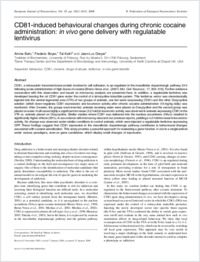CD81-induced behavioural changes during chronic cocaine administration: in vivo gene delivery with regulatable lentivirus
- Bahi, Amine Institute of Biochemistry, University of Fribourg, Switzerland
- Boyer, Frederic Institute of Biochemistry, University of Fribourg, Switzerland
- Kafri, Tal Gene Therapy Center and the Department of Microbiology and Immunology, University of North Carolina at Chapel Hill, USA
- Dreyer, Jean-Luc Institute of Biochemistry, University of Fribourg, Switzerland
-
05.04.2004
Published in:
- European Journal of Neuroscience. - 2004, vol. 19, no. 6, p. 1621-1633
English
CD81, a tetraspanin transmembrane protein involved in cell adhesion, is up-regulated in the mesolimbic dopaminergic pathway 24 h following acute administration of high doses of cocaine [Brenz-Verca et al., (2001) Mol. Cell. Neurosci., 17, 303-316]. Further evidence consecutive with this observation and based on microarray analysis are presented here. In addition, a regulatable lentivirus was developed bearing the rat CD81 gene under the control of a tetracycline inducible system. This lentivirus vector was stereotaxically injected into the ventral tegmental area (VTA) of two groups of animals, one fed water (expressing CD81) and the other Doxycycline solution (which down-regulates CD81 expression) and locomotor activity after chronic cocaine administration (10 mg/kg daily) was monitored. After 2 weeks, the groups were inverted, animals receiving water were placed on Doxycycline and the second group was placed on water. In all cases highly a significant increase (3.2-fold) in locomotor activity was observed in animals expressing CD81 in the VTA vs. animals placed on Doxycycline. Similar studies where CD81 was delivered into the nucleus accumbens (NAcc) resulted in significantly higher effects (30%), in accordance with microarray data and our previous reports, yielding a 4.2-fold increase in locomotor activity. No change was observed under similar conditions in control animals, which were injected a regulatable lentivirus expressing GFP. These findings suggest that CD81 expression in the mesolimbic dopaminergic pathway contributes to behavioural changes associated with cocaine sensitization. This study provides a powerful approach for evaluating a gene function in vivo in a single animal under various paradigms, even on gene candidates, which display small changes of expression.
- Faculty
- Faculté des sciences et de médecine
- Department
- Département de Médecine
- Language
-
- English
- Classification
- Medicine
- License
-
License undefined
- Identifiers
-
- RERO DOC 4255
- DOI 10.1111/j.1460-9568.2004.03260.x
- Persistent URL
- https://folia.unifr.ch/unifr/documents/299818
Statistics
Document views: 193
File downloads:
- Texte intégral: 391
